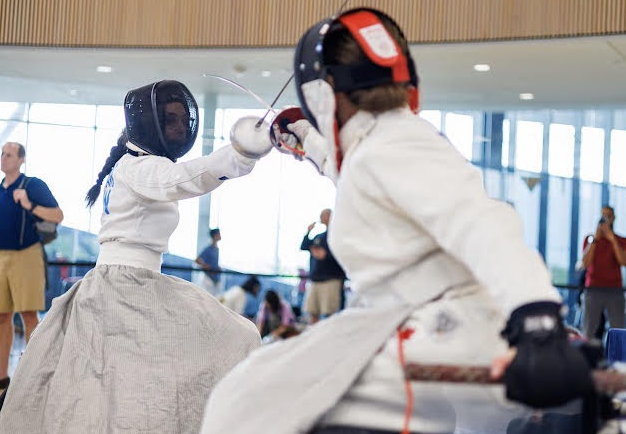OTTAWA – As a youngster, Trinity Lowthian competed in several sports but in 2018 doctors determined that her autonomic nervous system was inexplicably compromised.
She completed her last two years of high school mostly from the hospital and graduated with honours. In May 2022, a return to sport was possible and she inquired with the Ottawa Fencing Club to join as a Para athlete in the wheelchair version of the sport.
Since then, Lowthian has become a Pan Am champion and a contender for the 2024 Paralympic Games in the sport. She is also building the sport in her community as the young leader for the TRYumph Gymnastics Academy (which has integrated the Ottawa Fencing Club) wheelchair fencing program.
TRYumph was one of 18 organizations to receive grants from the 2023-24 Paralympic Sport Development Fund. The PSDF provides grants for local sport organizations, clubs, and programs that contribute to athlete and coach development along the Paralympic pathway.
Funding can support initiatives related to recruitment, coaching, competition, club development, training camps, or other programming that enhances capacity to support the development and experience of athletes and coaches.
‘’It helped so much,’’ said Lowthian, soon to graduate in nutritional studies at the University of Ottawa. ‘’A lot of the funding went towards equipment to get the frames for the chairs, which were designed to be customizable.’’
Other equipment purchased with the $10,000 grant included blades for the swords, seat cushions, wheelchair straps, and fencing aprons.
In addition, part of the grant went towards more training opportunities for athletes and coaches (which required honorariums) at the club. Also explored was the potential of fencing for other disabilities such as the visually impaired.
‘’These opportunities gave us a lot of knowledge and know-how of how to implement it back in the community. With that and the equipment, we were able to recruit a good group of people to start Para fencing and then go from there.’’
In fact, it was better than originally planned.
‘’As interest grows, we continue to modify the program to make it work with the equipment that we have, but more funds will be needed in order to accommodate for more equipment as well as coaching,” she noted. ‘’Startup costs are the biggest chunk that we have to cover. And so far it’s looking like a very sustainable model going forward.’’
Most of the participants so far are in their early 20s, said Lowthian. She added the participants are seeing the benefits of being physically active while enjoying a unique sport.
‘’Everybody, regardless of ability, deserves the opportunity to have a sport to participate in,” she said. ‘’Not only does it build community, but I find personally sport and staying active, the benefits are beyond anything physical, including the mental and emotional benefits. And there’s also the life skills and beyond that sport provides.”
As mentioned, standing versions of the sport are being introduced as well. In blind fencing, a rope is taped to the ground so athletes can feel with their feet that they are moving forward or backwards in a straight line. The scoring machines are modified with different sounds based on the side of the hit or who scored the touch.
At a recreational level, standing fencing can be for anyone interested, regardless of disability, and seated fencing can also be for anyone, regardless of disability. Standing fencing in able bodied competitions for amputees, individuals with Cerebral Palsy (CP) or intellectual disabilities is possible. Amputees and CP athletes can also be classified for wheelchair fencing at a competitive level.
Finding participants is hard work, admits Lowthian.
‘’It’s an unknown sport that really hasn’t been available to many people in the past,’’ she said about the Para versions of fencing. ‘’What’s interesting about the sport is just how broad the range of disabilities who can participate which is not often known.
‘’So getting that out there and finding the participants has definitely been the biggest challenge.’’
Lowthian was attracted to wheelchair fencing because it was different.
‘’It was so niche, and I really liked those sports,” she said. ‘’The one thing that I didn’t realize going into it was the fact that it’s so niche meant there’s really no funding or awareness or coaching or resources for it.
‘’But now I’m hoping to change that, and this grant has already helped with it.’’
For more information on the Para fencing program at TRYumph enquire at: info@tryumphgymnastics.ca
Applications are now open for the 2024-25 Paralympic Sport Development Fund. Please visit Paralympic.ca/sports/funding-opportunities for more information, including the application form and eligibility requirements. The deadline to submit applications is June 28, 2024.

